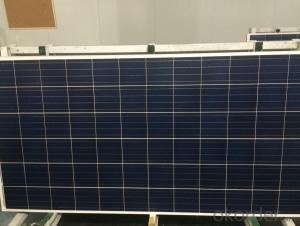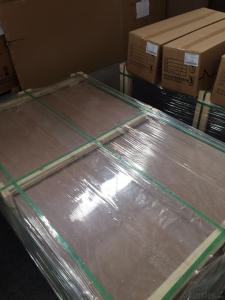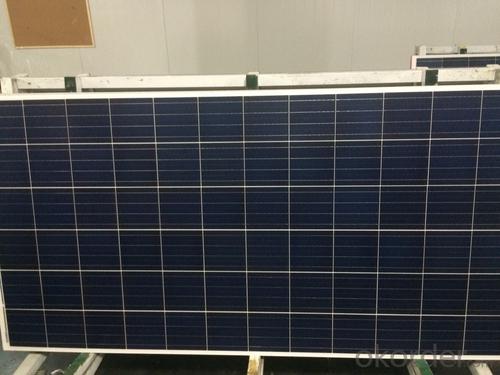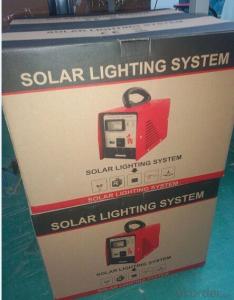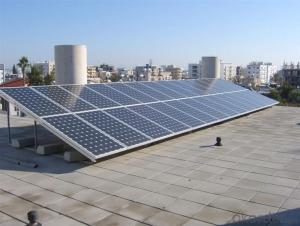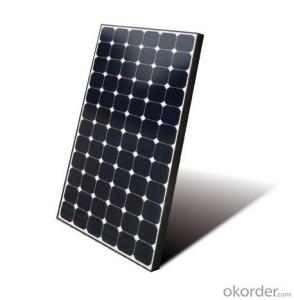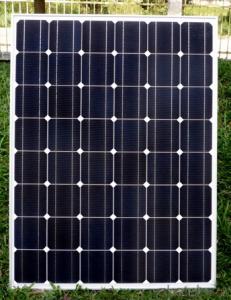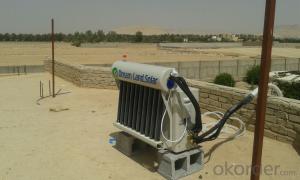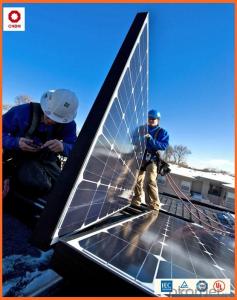200W Solar Home Solution Approved by TUV UL CE
- Loading Port:
- Shanghai
- Payment Terms:
- TT OR LC
- Min Order Qty:
- 1 pc
- Supply Capability:
- 100 pc/month
OKorder Service Pledge
OKorder Financial Service
You Might Also Like
Specification
200W Solar Home Solution Approved by TUV UL CE
Production description
Inverter:
Converts DC output power of photovaltaic soalr panels into standard AC power for use in the local off-grid
electrical network. It is a critical component in a photovoltaic system, allowing the use of ordinary
commercial appliances.
Battery banks:
Stores energy when there is an excess coming in and distribute it back out when there is a demand. Solar
PV panels continue to re-charge batteries each day to maintain battery charge.
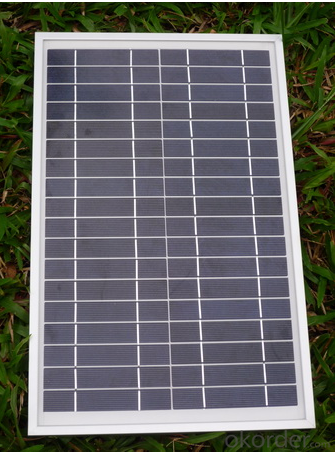
Feature
1.High conversion efficiencies resulting in superior power output performance.
2.Outstanding power output even in low light or high temperature conditions
3.Optimized design for ease of soldering and lamination
4.Long-term stability,reliability and performance
5.Low breakage rate
6.Color uniformaity
Physical characteristic
1. Rigorous quality control meets the highest international standards.
2. High-transmissivity low-iron tempered glass, strong aluminium frame.
3. Using UV-resistant silicon.
4. IS09001/14001/CE/TUV/UL
- Q: Can solar energy systems work during cloudy or rainy days?
- Solar energy systems can still work during cloudy or rainy days, although their efficiency may be reduced. While direct sunlight is the most effective way to generate solar energy, even diffused sunlight on cloudy or rainy days can still produce a certain amount of electricity.
- Q: How do solar energy systems impact the energy efficiency of a home?
- Solar energy systems have a significant impact on the energy efficiency of a home. By harnessing the power of the sun, these systems generate electricity that can be used to power various appliances and devices within the household. This reduces the dependence on traditional energy sources, such as fossil fuels, and helps in reducing greenhouse gas emissions. One of the key advantages of solar energy systems is that they provide a clean and renewable source of power. By utilizing the abundant sunlight, homeowners can generate their own electricity, thereby reducing their reliance on the grid. This not only helps in conserving natural resources but also lowers the overall carbon footprint of the household. Another way in which solar energy systems enhance energy efficiency is through the concept of net metering. Net metering allows homeowners to sell excess electricity generated by their solar panels back to the grid, thereby offsetting their energy consumption during times when the sun is not shining. This ensures that the energy produced by the solar panels is efficiently utilized and not wasted. Furthermore, solar energy systems often come with advanced monitoring and control features that allow homeowners to track their energy usage in real-time. This enables them to identify areas of high energy consumption and take necessary steps to optimize their energy usage. By making informed decisions based on this data, homeowners can further enhance the energy efficiency of their homes. In addition to reducing electricity bills, solar energy systems also increase the value of a home. Studies have shown that homes equipped with solar panels tend to sell at a higher price compared to those without. This is because potential buyers are attracted to the idea of reduced energy costs and an environmentally friendly lifestyle. Overall, solar energy systems play a crucial role in improving the energy efficiency of a home. By harnessing the power of the sun, homeowners can reduce their reliance on traditional energy sources, lower their carbon footprint, and save money on electricity bills. With continuous advancements in solar technology, these systems are becoming increasingly efficient and affordable, making them a viable option for homeowners looking to make their homes more energy-efficient.
- Q: What are the maintenance costs associated with solar energy systems?
- Compared to other forms of energy generation, solar energy systems generally have low maintenance costs. Solar panels themselves require minimal maintenance due to their lack of moving parts. However, there are a few important components that may need periodic maintenance or replacement. The cleaning of solar panels is one of the main maintenance costs. Over time, dust, dirt, and debris can build up on the surface of the panels, reducing their efficiency. Regular cleaning, which is typically carried out using water or a soft brush, helps ensure optimal energy production. Another maintenance cost involves inspecting and repairing electrical connections and wiring. These components are crucial for converting the sun's energy into usable electricity. Regular inspections can detect any loose connections or damaged wiring that may hinder the system's performance. Additionally, inverters, which convert the direct current (DC) generated by the solar panels into alternating current (AC) used in homes and businesses, may need to be replaced after a certain period. Inverter replacement is usually necessary every 10-15 years, depending on the manufacturer and usage. In conclusion, the maintenance costs associated with solar energy systems are relatively low compared to the long-term savings and benefits they offer. It is advisable to hire a professional solar installer or technician to perform regular inspections and maintenance to ensure the system operates efficiently and maximizes its lifespan.
- Q: Can solar energy systems be used for powering data centers or IT infrastructure?
- Yes, solar energy systems can be used for powering data centers or IT infrastructure. With advancements in solar technology and the increasing demand for sustainable energy sources, many data centers are now adopting solar power as a viable option for their energy needs. Solar panels can be installed on the rooftops or surrounding areas of data centers to harness sunlight and convert it into electricity. This renewable energy source not only helps reduce carbon emissions but also provides a reliable and cost-effective power supply for data centers, making it an environmentally friendly solution for powering IT infrastructure.
- Q: Can a solar energy system be installed on a flat roof?
- Yes, a solar energy system can be installed on a flat roof. In fact, flat roofs are often considered ideal for solar panel installations due to their unobstructed space and ease of installation.
- Q: Can solar energy systems be installed on ground-mounted structures?
- Yes, solar energy systems can be installed on ground-mounted structures. These structures provide a stable and efficient platform for solar panels, allowing them to be positioned at an optimal angle for capturing sunlight. Ground-mounted systems are often used in areas where roof space is limited or not suitable for installation, making them a popular choice for residential, commercial, and utility-scale solar projects.
- Q: Can solar energy systems be used in areas with limited space on rooftops due to existing equipment or structures?
- Yes, solar energy systems can still be used in areas with limited space on rooftops due to existing equipment or structures. In such cases, alternative solutions can be employed to maximize the utilization of available space. One option is to install solar panels on ground-mounted systems instead of rooftops. These systems can be placed in open areas adjacent to buildings or even on unused land nearby. Additionally, solar canopies or awnings can be installed in parking lots or other open spaces to generate solar power. These structures can be designed to provide shade and shelter while simultaneously harnessing solar energy. Thus, even in areas with limited rooftop space, there are various creative options available to implement solar energy systems.
- Q: Can a solar energy system be installed on a commercial building?
- Yes, a solar energy system can be installed on a commercial building. In fact, many businesses have embraced solar power as a sustainable and cost-effective solution for their energy needs. Installing a solar energy system on a commercial building offers multiple benefits, including reduced electricity bills, potential tax incentives and rebates, increased property value, and a positive brand image associated with environmental responsibility. Commercial buildings typically have ample rooftop space, making them ideal for solar panel installation. Additionally, advancements in solar technology have made it easier and more efficient to integrate solar systems into commercial buildings. With proper planning and professional installation, a solar energy system can provide clean and renewable energy to power various operations within a commercial building, contributing to a greener and more sustainable future.
- Q: Can solar energy systems be used for large-scale power generation?
- Yes, solar energy systems can be used for large-scale power generation. With advancements in technology and decreasing costs, solar power plants and solar farms are being built around the world to generate electricity on a large scale. These solar energy systems utilize photovoltaic panels or concentrated solar power technology to convert sunlight into electricity, making them a sustainable and renewable source of power for meeting the energy demands of entire communities or even countries.
- Q: Can a solar energy system increase the value of my home?
- Yes, a solar energy system can increase the value of your home. Installing solar panels on your property can be seen as a valuable investment by potential buyers, as it offers several financial and environmental benefits. Firstly, solar energy systems can significantly reduce or even eliminate your monthly electricity bills, which is an attractive feature for potential homeowners. This can result in long-term savings for the new owners, making the property more appealing. Furthermore, solar panels are considered a sustainable and eco-friendly energy solution, which is becoming increasingly important to many homebuyers. As the world moves towards a greener future, properties with solar energy systems are seen as more desirable and can attract a wider pool of potential buyers. Studies have shown that homes with solar panels tend to sell faster and at higher prices than similar properties without them. A study conducted by the Lawrence Berkeley National Laboratory found that homes equipped with solar panels typically sold for a premium of around $15,000 compared to homes without solar. This demonstrates that solar energy systems can indeed increase the value of your home and provide a return on your investment. It is important to note that the increase in value will depend on various factors such as the size and efficiency of the solar energy system, the local real estate market, and the overall condition of your property. Consulting with a real estate professional who specializes in sustainable homes can provide you with more specific information regarding the potential value increase of your home. In summary, installing a solar energy system can enhance the value of your home by reducing energy costs, appealing to environmentally conscious buyers, and potentially selling at a higher price. With the growing emphasis on renewable energy, investing in solar power can be a wise decision that not only benefits you financially but also contributes to a greener future.
Send your message to us
200W Solar Home Solution Approved by TUV UL CE
- Loading Port:
- Shanghai
- Payment Terms:
- TT OR LC
- Min Order Qty:
- 1 pc
- Supply Capability:
- 100 pc/month
OKorder Service Pledge
OKorder Financial Service
Similar products
Hot products
Hot Searches
Related keywords
